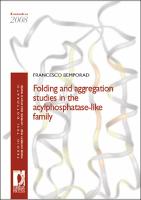Folding and aggregation studies in the acylphosphatase-like family
Abstract
Folding and misfolding of proteins are considered two sides of the same coin. The delicate equilibrium existing between these two processes is crucial for any living organism and its alterations can lead to the onset of several tremendous diseases, such as Alzheimer's and Parkinson's disease. The attainment of a profound knowledge of folding/misfolding processes is a key step to understand how life works and for discovering new therapies to these diseases. In this work the author shows that proteins can display enzymatic activity even in the absence of a compact three-dimensional structure, with important implications for the study of protein enzymes. Furthermore, the author investigates the formation of protein aggregates similar to those observed in patients of amyloid-related diseases.


 Download
Download Web Shop
Web Shop